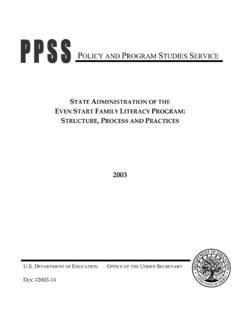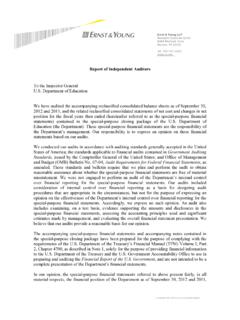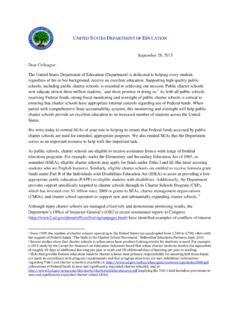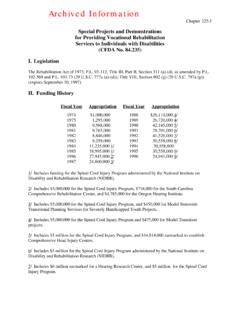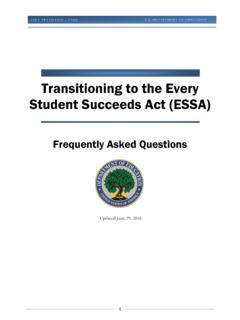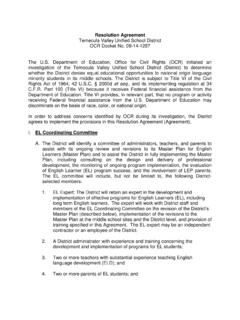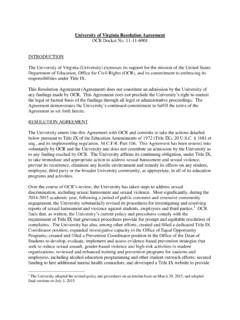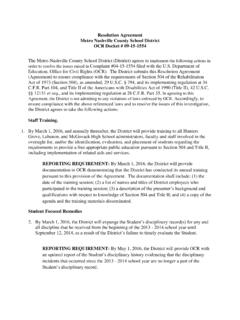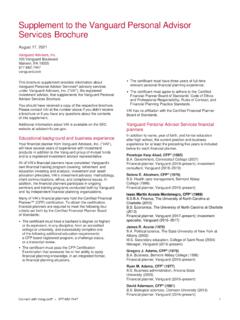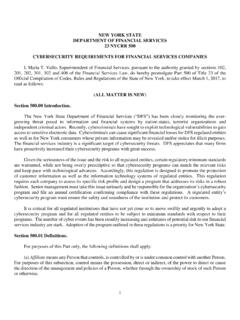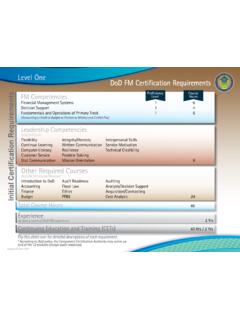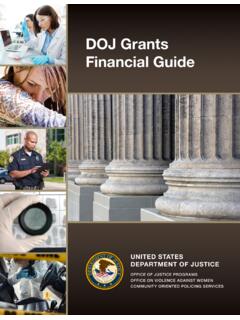Transcription of Records and Information Management Program (PDF)
1 ADMINISTRATIVE COMMUNICATIONS SYSTEM DEPARTMENT OF EDUCATION DEPARTMENTAL DIRECTIVE OM: 6-103 Page 1 of 25 (04/14/2017) Distribution: All Department of Education Employees Signed by: Denise L. Carter Acting Assistant Secretary for Management Records and Information Management Program Table of Contents I. Purpose .. 2II. General Policy .. 3 III. 8IV. 11V. Definitions and Acronym Glossary .. 11VI. Responsibilities .. 15 VII. Requirements .. 21 For technical Information regarding this document, please contact Sherry Smith via email or at 202-401-0902. Supersedes: OM: 6-103 Records and Information Management Program , dated 05/04/2016. OM: 6-103 Page 2 of 25 (04/14/2017) I. Purpose This Directive establishes the overall policies and procedures to be followed by the Department of Education s (ED) Principal Offices (POs), employees, and contractors in complying with the requirements of the Federal Records Act of 1950 as codified in 44 Chapters 29, 31, and 33, as revised by the Presidential and Federal Records Act Amendments of 2014 (Amendments to the Federal Records Act of 2014) and the National Archives and Records Administration (NARA) implementing regulations contained in 36 CFR 1220 through 1239 for establishing and maintaining a Records Management Program in administrative and mission-related activities that is compliant with the relevant statutes, regulations, NARA-issued guidance, and Departmental Records Management policies.
2 This Directive also authorizes the issuance of a Records and Information Management Manual ( Records Manual), for Principal Office Records Liaison Officers (RLOs) and a Records Management Handbook for all employees which includes processes and procedures for specific categories of Records and Records Management activities. However, this Directive does not address all Information resources Management requirements affecting Records Management . This Directive should be considered in context with other ED Information Resource Management (IRM) policies located at the Records and Document Management Division on connectED at, A. The specific objectives of the Records Management Program are: 1. To establish responsibilities and requirements for developing, implementing and maintaining an efficient and effective, NARA-compliant Records Management Program at ED.
3 2. To facilitate ED s transition to full electronic recordkeeping as the foundation of an electronic Records Management Program in compliance with the provisions of the Presidential Memorandum dated November 28, 2011, Managing Government Records and the OMB/Directive M-12-18, Managing Government Records . 3. To provide support for ED s mission of promoting educational excellence for all Americans through: a. Ensuring that every ED senior official, employee, and contractor is aware that they have specific Records Management responsibilities imposed by statute and regulation, and to provide training in how to meet those responsibilities; OM: 6-103 Page 3 of 25 (04/14/2017) b. Creating and preserving adequate and proper documentation of ED activities, organization functions, policies, decisions, procedures, and essential transactions; c.
4 Appropriate access, retrieval, maintenance, and use of ED Records in all formats; and d. Proper Records retention and disposition of ED Records in all formats. B. To comply with the Federal Records Act, and applicable statutes, authorities, and regulations as listed in the Authorization section. Proper Records Management helps assure efficient and effective administration of programs , minimizes costs, fulfills legal responsibilities, provides an adequate audit trail, and Records the history and intent of public policy. C. To preserve historical Information , thereby enabling ED employees, ED contractors, and their successors to retrieve Information needed to make informed decisions. D. To establish an essential Records Program that identifies, protects, and provides ready access to Records necessary to ensure continuity of essential Departmental activities in the event of a national disaster or emergency.
5 E. To promote open government and support the principals of transparency in government. II. General Policy It is the policy of ED to create, preserve, maintain, use, and dispose of Federal Records in compliance with the requirements of the Federal Records Act of 2014, as amended and applicable NARA regulations, and to ensure access to Information by ED officials, and the public, as appropriate. This policy covers all Records , regardless of format or location that meet the criteria for Federal Records . Unstructured electronic Records (see definition) will either be maintained in a NARA-compliant electronic recordkeeping system or printed to paper for recordkeeping. POs are authorized to organize their shared drives as recordkeeping systems, (in accordance with NARA guidelines) as an interim measure until the Enterprise Electronic Records Management System (EERMS) is implemented within their office.
6 Structured electronic Records , such as data sets, will be managed as Federal Records within their system of origin. ED and POs will establish and maintain effective and efficient practices for the Management of Federal Records in all formats. Principal Officers and Program and administrative managers have the ultimate functional responsibility for OM: 6-103 Page 4 of 25 (04/14/2017) implementing ED Records Management policies and procedures in their operational areas. Each PO is responsible for ensuring that its Program Records are covered by and managed in accordance with appropriate retention and disposition schedules, and imposition any corresponding litigation, Freedom of Information Act (FOIA) or oversight holds. Records not covered by ED s Records Retention and Disposition Schedules or NARA-issued General Records Schedules (GRS) must be scheduled by application to NARA for legal disposition authority.
7 Unscheduled Records shall not be destroyed or deleted, whether in paper or electronic format. A. Electronic Messaging Electronic messages, as defined by the Amendments to the Federal Records Act of 2014, shall be managed in accordance with the provisions of the Amendment, including those Records created or received by mobile devices. Personal email accounts shall not be used for the conduct of government business. However, if a Federal record is created or received in a personal email account, it shall be forwarded to the ED email system or printed to paper for recordkeeping within 20 days (with the exception of Saturdays, Sundays, and legal public holidays). If a Federal record is created or received as an electronic message, it shall either be forwarded to the ED email system by the individual user or captured centrally as part of network operations related to the ED network.
8 ED shall not destroy any email until receiving NARA disposition approval for its use of NARA s Capstone approach. This approach may involve use of GRS for disposition or by applying to NARA for independent disposition authority through submission of ED-specific Records retention schedules. The Office of the Chief Information Officer (OCIO) is responsible for managing electronic messaging Records with the exception of Records created and maintained on individual mobile devices, whether government furnished telephones or tablets or privately-owned cell phones registered through the Bring Your Own Device Program . Principal Offices are responsible for properly managing electronic messages created by use of social media applications. The individual owner or user is responsible for managing electronic messages such as text messages that are created or received using the mobile devices discussed above.
9 Text messages that qualify as federal Records must be forwarded to ED s email system for recordkeeping purposes. Please contact OM: 6-103 Page 5 of 25 (04/14/2017) the Mobile Services Help Desk, at (202) 245-8470 for technical assistance on capturing and preserving text messages in the ED email system. B. Electronic Records Management Requirements POs are authorized to establish electronic recordkeeping systems (as defined by NARA) on their shared drive as a substitute for print and file. POs that utilize their shared drive as a recordkeeping system are required to the meet the requirements of NARA Bulletin 2012-02 Guidance on Managing Content on a Shared Drive. C. Internal Evaluations of Records programs POs shall conduct an annual internal evaluation ( Records Management self-assessment) of their Records Management programs to certify that their programs are operating in compliance with NARA and ED policies and procedures.
10 Principal Office Program Records Officials (PRO) will submit the annual certification to ED s Records Officer by December 31st of each year. POs will conduct, in conjunction with ED s Records Officer, an in-depth evaluation of their Records Management Program every three (3) years (triennial Records Management self-assessment). This in-depth review will consist of, but not be limited to, Records sampling, record inventories, updates to Program record schedules, and personalized training. POs will submit an annual corrective action plan to ED s Records Officer that addresses any deficiencies identified in the annual internal evaluation and/or the triennial review. The POs designated RLOs are responsible for performing these evaluations. Reviews and evaluations will be conducted in accordance with NARA regulations and, NARA Records Management Self-Evaluation Guide, and ED s Records Management policies and procedures.
